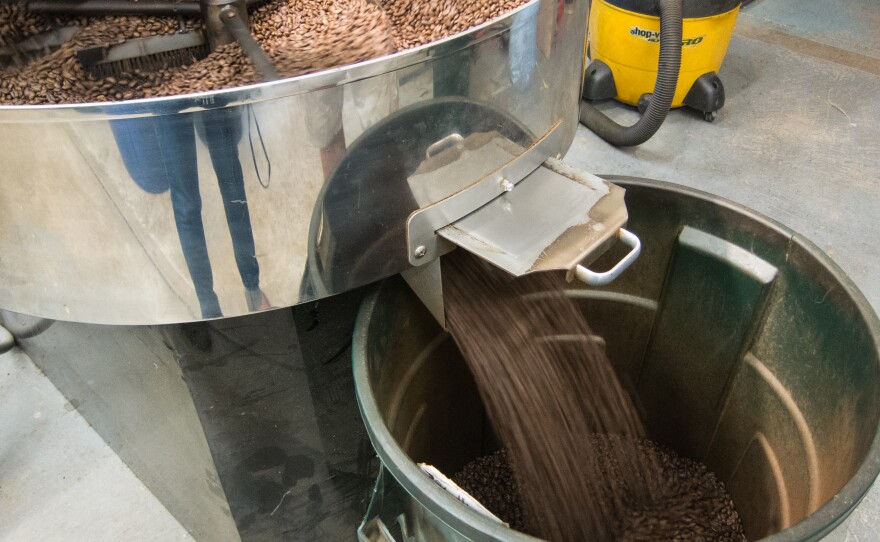Aspen staple Ink Coffee say they’re the only shop in the area which roasts and sells its own beans. Making the perfect roast is no small task…the shop relies on the skills and passion of its roast master, John Rose. Aspen Public Radio’s Rebecca Kruth spoke with Rose to find out more about his love for coffee and what goes into making the perfect roast.
It’s pretty safe to say that anyone who walks into Ink Coffee’s roasting headquarters in Basalt is going to notice one thing right away - the rich aroma of freshly roasted Joe.
It's a small building squeezed into a industrial park next to a deli, and it's been home to John Rose’s roasting passion for nearly 20 years.
Rose, or Hoss, as his friends call him, is the roastmaster for local chain Ink Coffee.
He says he doesn’t even notice the smell anymore.
"It’s funny, I’ll be in the supermarket or somewhere, and people will actually start looking around and asking if you smell a fire, or ‘Oh, it smells like burnt toast, I wonder where that’s coming from,’ and it’s usually, ‘Oh, it’s me,'" Rose said.
From an outsider’s perspective, roasting coffee looks like nothing more than green beans going into a giant, noisy roaster and then coming out nicely browned and ready to go.
As Rose will tell you, there's much more to it than that.
It all begins with a bucket of beans, which Rose selects from his vast supply.
"These right here are a Sumatra, Indonesian coffee."
Rose pours the beans into a big hopper then pulls a lever. The beans drop into the enormous roaster. The machine makes a loud whirring sound while the beans rattle around inside the drum.
"You can hear those being agitated in there," Rose said. "It’s a big drum that rotates, and it’s got some fins in it that’ll keep stirring those beans. It’s almost like a big commercial dryer."
Using his eyes, ears, nose and plain old science, Rose knows precisely when certain chemical reactions are taking place during the roasting process. Depending on the type of roast, he’ll adjust heat and airflow to manipulate acids and oils and bring out the beans’ unique flavors.
It’s a skill years in the making.
"Ten years ago, I didn’t know how to manipulate the coffee to where if somebody came back and said, ‘Hey, roast that so it’s a little sweeter,’ [I could]," Rose said. "I know how to do that now. I’m not going to tell you how to do that, but I can do that.”
Roasting is a way of life for Rose, but a few years back, something threatened to change that.
He noticed his balance was off, he was clumsier. For a long time, he just thought he was getting older.
Then one day, Rose was walking his dogs, and they were able to drag him head first into a river.
"I weigh 250 lbs, and those dogs should not have been able to pull me into that water like they did," he said. "First thing I did was make sure nobody saw it, because it was embarrassing."
Rose was diagnosed with MS, multiple sclerosis, a chronic disease that attacks the nervous system. Symptoms are inconsistent and not always obvious. Rose says that makes it hard for others to understand the disease.
Once, while meeting some friends for dinner, the bartender at the restaurant refused to serve him.
"He thought I was drunk. When my legs are feeling weak, I walk kind of funny. I can see how he thought I was tipsy. At the time I didn’t know how to deal with it, so I didn’t want to argue with him about it," Rose said.
The disease has definitely changed Rose’s life. Still, he said, he doesn’t let it define him.
That’s meant making some adjustments.
"I want to be able to do what I want to do, and if that means I can only walk up Smuggler as opposed to climbing up Maroon Bells, that’s fine. I’m still getting out there," Rose said.
And he still spends most of his week roasting coffee.
Rose said he knows there could come a day when MS may keep him from doing his job, but for now, he’s determined to keep moving and keep roasting.
"I really think that it can slow you down, but I hate to think that it can stop you."
On this day, MS is far from his mind. Rose is immersed instead in creating the perfect batch of Sumatra coffee.












